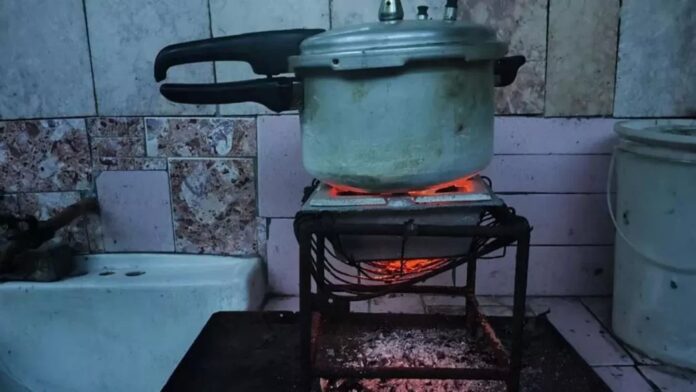Relics of the 1990s “Special Period” crisis

Power cuts and fuel shortages make life more miserable for Cuban families every day.
By Juan Diego Rodriguez/Mercedes Garcia (14ymedio)
HAVANA TIMES – It is nighttime and – it is almost a truism when it comes to Cuba – there is a blackout. If a family wants to eat early, it is best to get going before the sun goes down. Those lucky enough to have an open patio will have less work to do and the stench of smoke and soot will not permeate the walls of the house. Those who are not lucky enough will have to set up the stove, with all the fanfare that it brings, on the counter. And resign themselves.
The design may vary – as the “veterans” of the Special Period know well, they were cautious and never got rid of them – but the principle is the same: a metal plate on the bottom or slab to contain the embers; an iron support; the stove itself, with its grate so that the fire can breathe; and the coal, true black gold now that there is no fuel.
It takes a lot of patience and practice not to burn yourself. A minimum of alcohol or gasoline is needed to light the embers, and if there are no matches, the procedure is even more cumbersome. At home, children stare at the flames in a daze. The flames crackle in the darkness under the cauldron. For adults, overwhelmed by the heat twice over – the tropical heat and that of the stove – it is a sad reminder that, in Cuba, even misery is recycled.
Cooking with charcoal is one of the most degrading methods for Cuban families, not only because of the dirt and cumbersome process, but because it involves new expenses and more lines. The demand for stoves has skyrocketed, even on online sales sites. Not all homes have kept the iron utensils and there are young couples who are “initiating” themselves in the use of charcoal.
Pedro, a 32-year-old father in Sancti Spíritus, is desperately looking for a sack. When he went by bicycle to the place where he knew they were selling it, he found the gate closed and a sign: “There is a dog. And it bites.” He went closer, however, and saw another, smaller sign: “Tomorrow afternoon.”
“I knocked on the door anyway to see if they would help me,” Pedro told 14ymedio. One of the employees opened the door. “We are closed,” he said, “and there is a line. When the coal arrives, people go nuts.” If he manages to catch it, it will cost him between 1,000 and 1,200 pesos a sack.
The charcoal they sell is of the third kind. On the international market, Cuba has made a good profit from its first-class marabou charcoal: it is used abroad for barbecues in the summer. Pedro has seen them on the internet: oval-shaped or rectangular smokers, in which juicy steaks and hamburgers are placed, meats that will never make it to his family’s cooker.

“Everyone here has rediscovered coal since the gas ran out,” he laments, bicycle in hand and heading to another post.
Pedro, at least, now has his stove. If he had to get a new one, it could cost up to 5,000 pesos. That was the price Ana, a housewife from Camagüey, paid for hers. Four twisted rebars serve as legs for the stand.
Towards the middle of the structure, a metal square collects the ashes and pieces that fall from the grill. He got a deep-bottomed burner, he says: “It can fit more coal.” Although that also has its drawbacks. It may increase the “power” of the cooking, but it will consume more wood.
Ana expects her grill, which is made of iron, to last longer than the modest aluminum burners that many Cubans are buying. They look shiny, but the strength and durability of the metal is not the same as older ones, she says. New ones without a stand cost around 1,800 pesos. They are not very deep either.
When it’s time to eat, Cuba is once again filled with small clouds of smoke in the courtyards. It is a time machine heading to the Special Period. The storage rooms, where for decades Cubans accumulated hundreds of bits of junk that they considered useless, are gradually emptied. The streetlights, the oil lamps, the little dynamo radios and the wood stoves return. And with them, sadness.
Translated by Translating Cuba.
Read more from Cuba here on Havana Times.




